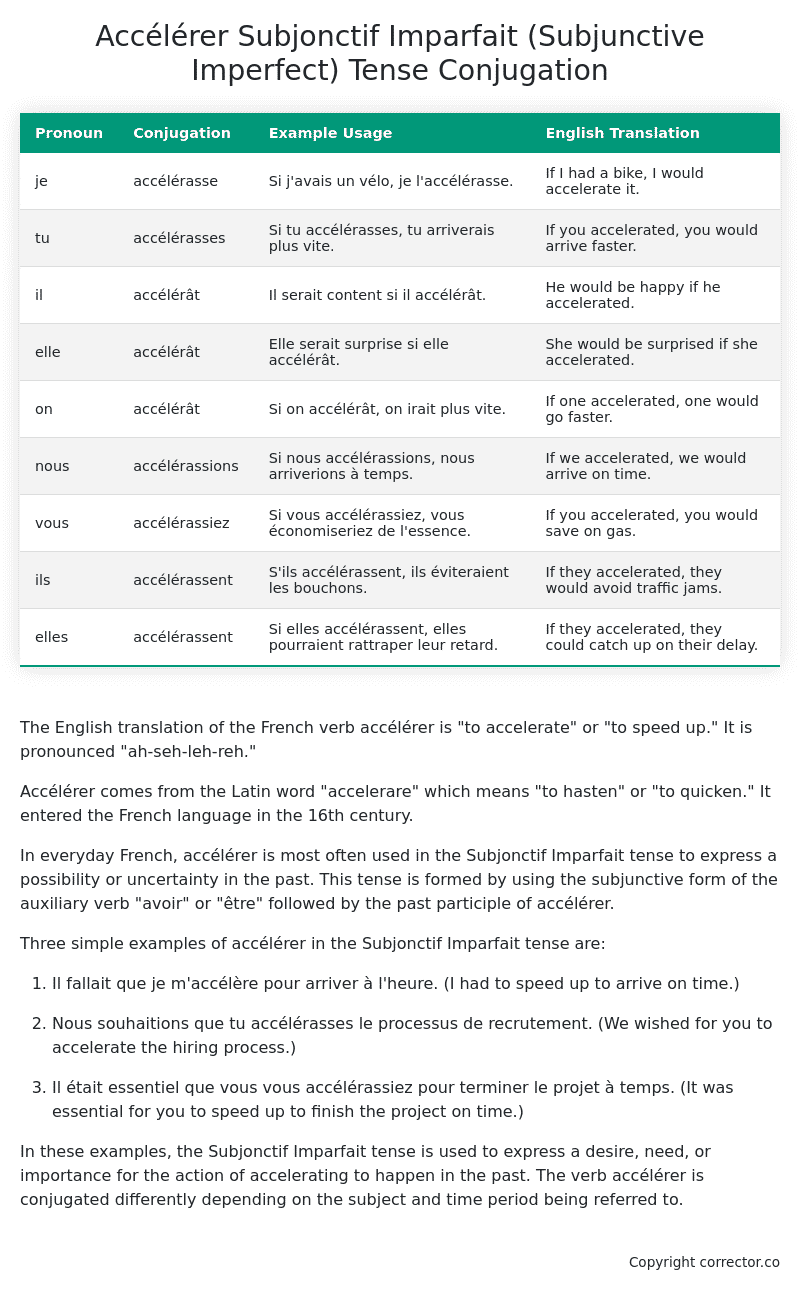Subjonctif Imparfait (Subjunctive Imperfect) Tense Conjugation of the French Verb accélérer
Introduction to the verb accélérer
The English translation of the French verb accélérer is “to accelerate” or “to speed up.” It is pronounced “ah-seh-leh-reh.”
Accélérer comes from the Latin word “accelerare” which means “to hasten” or “to quicken.” It entered the French language in the 16th century.
In everyday French, accélérer is most often used in the Subjonctif Imparfait tense to express a possibility or uncertainty in the past. This tense is formed by using the subjunctive form of the auxiliary verb “avoir” or “être” followed by the past participle of accélérer.
Three simple examples of accélérer in the Subjonctif Imparfait tense are:
-
Il fallait que je m’accélère pour arriver à l’heure. (I had to speed up to arrive on time.)
-
Nous souhaitions que tu accélérasses le processus de recrutement. (We wished for you to accelerate the hiring process.)
-
Il était essentiel que vous vous accélérassiez pour terminer le projet à temps. (It was essential for you to speed up to finish the project on time.)
In these examples, the Subjonctif Imparfait tense is used to express a desire, need, or importance for the action of accelerating to happen in the past. The verb accélérer is conjugated differently depending on the subject and time period being referred to.
Table of the Subjonctif Imparfait (Subjunctive Imperfect) Tense Conjugation of accélérer
| Pronoun | Conjugation | Example Usage | English Translation |
|---|---|---|---|
| je | accélérasse | Si j’avais un vélo, je l’accélérasse. | If I had a bike, I would accelerate it. |
| tu | accélérasses | Si tu accélérasses, tu arriverais plus vite. | If you accelerated, you would arrive faster. |
| il | accélérât | Il serait content si il accélérât. | He would be happy if he accelerated. |
| elle | accélérât | Elle serait surprise si elle accélérât. | She would be surprised if she accelerated. |
| on | accélérât | Si on accélérât, on irait plus vite. | If one accelerated, one would go faster. |
| nous | accélérassions | Si nous accélérassions, nous arriverions à temps. | If we accelerated, we would arrive on time. |
| vous | accélérassiez | Si vous accélérassiez, vous économiseriez de l’essence. | If you accelerated, you would save on gas. |
| ils | accélérassent | S’ils accélérassent, ils éviteraient les bouchons. | If they accelerated, they would avoid traffic jams. |
| elles | accélérassent | Si elles accélérassent, elles pourraient rattraper leur retard. | If they accelerated, they could catch up on their delay. |
Other Conjugations for Accélérer.
Le Present (Present Tense) Conjugation of the French Verb accélérer
Imparfait (Imperfect) Tense Conjugation of the French Verb accélérer
Passé Simple (Simple Past) Tense Conjugation of the French Verb accélérer
Passé Composé (Present Perfect) Tense Conjugation of the French Verb accélérer
Futur Simple (Simple Future) Tense Conjugation of the French Verb accélérer
Futur Proche (Near Future) Tense Conjugation of the French Verb accélérer
Plus-que-parfait (Pluperfect) Tense Conjugation of the French Verb accélérer
Passé Antérieur (Past Anterior) Tense Conjugation of the French Verb accélérer
Futur Antérieur (Future Anterior) Tense Conjugation of the French Verb accélérer
Subjonctif Présent (Subjunctive Present) Tense Conjugation of the French Verb accélérer
Subjonctif Passé (Subjunctive Past) Tense Conjugation of the French Verb accélérer
Subjonctif Imparfait (Subjunctive Imperfect) Tense Conjugation of the French Verb accélérer (this article)
Subjonctif Plus-que-parfait (Subjunctive Pluperfect) Tense Conjugation of the French Verb accélérer
Conditionnel Présent (Conditional Present) Tense Conjugation of the French Verb accélérer
Conditionnel Passé (Conditional Past) Tense Conjugation of the French Verb accélérer
L’impératif Présent (Imperative Present) Tense Conjugation of the French Verb accélérer
L’infinitif Présent (Infinitive Present) Tense Conjugation of the French Verb accélérer
Struggling with French verbs or the language in general? Why not use our free French Grammar Checker – no registration required!
Get a FREE Download Study Sheet of this Conjugation 🔥
Simply right click the image below, click “save image” and get your free reference for the accélérer Subjonctif Imparfait tense conjugation!

Accélérer – About the French Subjonctif Imparfait (Subjunctive Imperfect) Tense
Formation
Common Everyday Usage Patterns
Interactions with Other Tenses
Subjonctif Présent
Indicatif Passé Composé
Conditional
Conditional Perfect
Summary
I hope you enjoyed this article on the verb accélérer. Still in a learning mood? Check out another TOTALLY random French verb conjugation!


